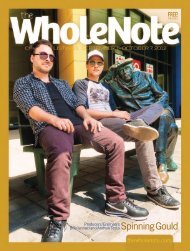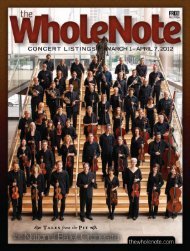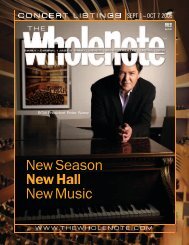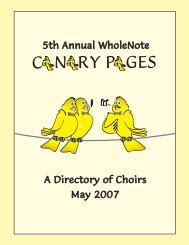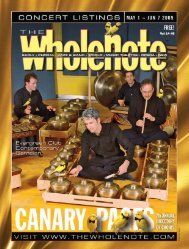You also want an ePaper? Increase the reach of your titles
YUMPU automatically turns print PDFs into web optimized ePapers that Google loves.
Old Wine, New Bottles | Fine Old Recordings Re-Released<br />
Many of us have attended or heard<br />
performances of the Brahms First<br />
Symphony that for the most part<br />
have slipped from memory. As<br />
important as it is, this symphony has fallen<br />
into the war-horse, crowd-pleaser category<br />
and a performance whether heard live or via<br />
recordings can appear to be just another work<br />
on the program, or a revelation! Granted any<br />
first hearing will be a unique experience but<br />
one would need to be quite familiar with a<br />
few different <strong>version</strong>s to recognize that a particular<br />
new performance is exceptional. Case<br />
in point is a new release of a concert performance<br />
by the Vienna Symphony Orchestra<br />
conducted by Sergiu Celibidache (Vienna<br />
Symphony CD, WS002 mono).<br />
Celibidache refused to make commercial<br />
recordings, stating that<br />
such documents would only<br />
reveal how he conducted the<br />
work at that time of day, on that<br />
date, in that venue ... etc., etc. On<br />
the evening of October 30, 1952, in<br />
the Konzerthaus, this is how they<br />
played! It remains a truly memorable<br />
event. The playing is articulate, no<br />
slurring, clean winds and brass<br />
and no pregnant pauses. The music<br />
seems to drive itself. This is a passionate<br />
performance directed by a<br />
young firebrand and is no way akin<br />
to his later settled-in and comfortable<br />
<strong>version</strong>s — from the 1976<br />
Stuttgart RSO (DG) and the 1987<br />
Munich Philharmonic (EMI). This<br />
performance remains not a monument<br />
to Brahms but a celebration.<br />
The mono sound is full bodied<br />
and dynamic, typical of the best engineering<br />
of the day.<br />
Although there were others, for the second<br />
half of the 20th century and beyond, when<br />
one considered performances of Schubert<br />
lieder, the late Dietrich Fischer-Dieskau<br />
enjoyed his well-deserved prime reputation.<br />
Of course, he was also known for his Mozart,<br />
Beethoven, Schumann, Hugo Wolf, Mahler<br />
and Richard Strauss and others from Bach<br />
to Berg and Britten. And he loved to make<br />
recordings.<br />
He recorded the three Schubert cycles<br />
many times, because, unlike instrumentalists<br />
and some conductors, he wanted a wide<br />
audience to know how he sang it that day<br />
BRUCE SURTEES<br />
with that accompanist. He talks about this<br />
in a charming interview/conversation dating<br />
from the 1985 Schubertiade, part of a<br />
DVD release from Arthaus Musik of Schubert<br />
(Arthaus 107523, 2 DVDs). Die Schöne<br />
Müllerin was recorded live in 1991 at the<br />
Montforthaus in Feldkirch with Andres Schiff<br />
including, as a bonus, the conversation<br />
with Franz Zoglauer.<br />
Winterreise was filmed a dozen<br />
years earlier in Siemens Villa,<br />
Berlin in 1979 and includes<br />
almost an hour of rehearsal for<br />
the recital with Alfred Brendel.<br />
So why would this singer require<br />
a rehearsal of what was his basic<br />
repertoire? As he says<br />
on the other disc, different<br />
accompanists<br />
can elicit different<br />
variations in his<br />
interpretation and<br />
together they work it<br />
out. Together, the two<br />
DVDs provide a most<br />
satisfying evening.<br />
I must remind readers<br />
of what I consider<br />
to be the most satisfying<br />
recording ever of<br />
Das Lied von der Erde:<br />
Fischer-Dieskau conducting<br />
the Stuttgart<br />
Radio Symphony<br />
Orchestra with alto,<br />
Yve Janicke and tenor<br />
Christian Elsner (Orfeo<br />
C494001 B). Not surprisingly,<br />
the orchestral<br />
playing is unusually expressive and much<br />
more sublimely lyrical than other <strong>version</strong>s<br />
particularly, but not only in the winds. The<br />
overwhelming loneliness and resignation of<br />
Der Abschied is heart-breaking. Recorded in<br />
concert on June 22 at the 1996 Schubertiade<br />
in the medieval town of Feldkirch, this would<br />
be one of my ten Desert Island discs.<br />
Alfred Cortot was one of the most respected<br />
musicians and pianists of the early 1900s<br />
and into the 1950s. His recordings were once<br />
the cornerstones in the libraries of Chopin<br />
and Schumann aficionados around the<br />
world. Cortot was born in 1877 in the Suisse<br />
Romande and studied and was awarded in<br />
Paris. He was choral conductor in Bayreuth<br />
in 1901 and was responsible for the mounting<br />
of Götterdämmerung in Paris in 1902<br />
which he also conducted. The Cortot, Casals<br />
and Jacques Thibaud Trio had a well-deserved<br />
reputation and was in part responsible for<br />
elevation of the trio form from the salon<br />
to the concert stage. Cortot was a sensitive<br />
accompanist for singers and string<br />
players alike. He also conducted<br />
notable recordings.<br />
Today, perfect technique has<br />
become the norm and the prime<br />
concern of audiences who, to<br />
paraphrase Professor Higgins,<br />
don’t care about what instrumentalists<br />
play as long as they play all<br />
the right notes. Cortot was one of<br />
the last musicians from the times<br />
when personal and intuitive interpretations<br />
overrode minor concern<br />
for technical perfection.<br />
The motherlode of his<br />
recordings, Alfred Cortot An<br />
Anniversary Edition, contains<br />
every EMI recording<br />
from 1919 to 1959 including unreleased<br />
items (EMI 5099970490725 40<br />
CDS). As of this writing, a complete<br />
list of the some 275 works<br />
can only be seen at Arkivmusic:<br />
arkivmusic.com/classical/album.<br />
jsp?album_id=817326.<br />
Chatting about this totally new,<br />
all newly remastered set recently,<br />
I was asked “Did they leave in all<br />
the wrong notes?” Yes, they did.<br />
ICA Classics continues to<br />
release DVDs of concert performances<br />
featuring Benjamin Britten<br />
conducting the English Chamber Orchestra<br />
in The Maltings Concert Hall in Aldeburgh as<br />
they were recorded for broadcast by the BBC.<br />
From June 16, 1968 (ICAD 5025) Mstislav<br />
Rostropovich is the soloist in Tchaikovsky’s<br />
Rococo Variations Op 33 and the Pezzo<br />
capriccioso Op.62. The orchestra plays the<br />
Romeo and Juliet Fantasy Overture. Also<br />
on this DVD, the orchestra is joined by the<br />
Aldeburgh Festival Singers on June 5, 1970,<br />
from a performance of a suite from Britten’s<br />
Gloriana: The Tournament, The Lute Song<br />
(with Peter Pears) and Apotheosis. As this is<br />
the only recording of Britten conducting anything<br />
from Gloriana it will be of particular<br />
interest to collectors.<br />
60 thewholenote.com February 1 – March 7, 2013





